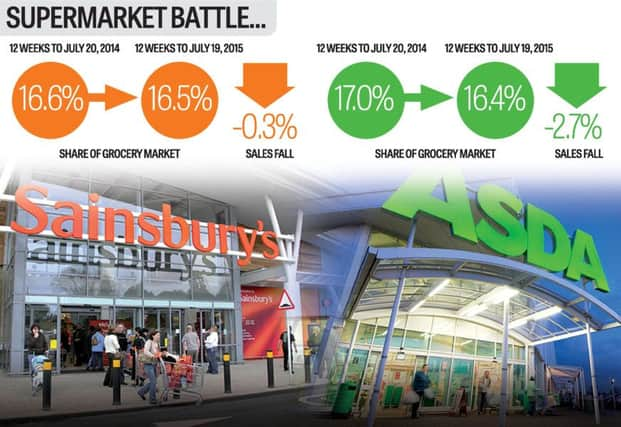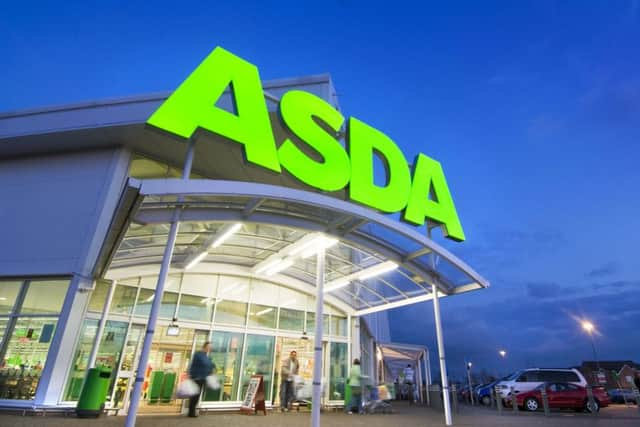Asda drops into third place as it suffers biggest sales decline


Leeds-based Asda has refused to issue the money off vouchers that rivals such as Morrisons and Tesco have resorted to in a bid to win shoppers back from the discounters, Aldi and Lidl.
Asda believes that its focus on keeping prices at a constant low rather than yo-yo pricing is the way to shoppers’ hearts.
Advertisement
Hide AdAdvertisement
Hide AdChief executive Andy Clarke has likened his rivals’ tactics to The Bank of England’s quantitative easing programme and said that this sort of short term discounting has to end soon as it’s unsustainable.


Asda’s sales fell 2.7 percent over the 12 weeks to July 19, reducing its market share to 16.4 per cent from 17.0 per cent in the same period last year.
That meant Sainsbury’s overtook Asda with a market share of 16.5 per cent, even though its own sales fell 0.3 per cent.
Fraser McKevitt, Kantar Worldpanel’s head of consumer and retail insight, said: “All this year the share gap between Asda and Sainsbury’s has been very close.
Advertisement
Hide AdAdvertisement
Hide Ad“Asda will be the number three retailer and won’t be happy about it, but they could easily change position again.
“Asda is run slightly differently to other retailers. They’re not listed in the UK and they are not chasing share at any cost, but are trying to run the business profitably.”
Mr Clarke insists that his long-term strategy is the right one.
“Sales are for vanity, profits are for sanity,” he said in May after Asda reported its worst sales fall in more than 20 years.
Advertisement
Hide AdAdvertisement
Hide AdAnalysts say the pressure is now mounting on Mr Clarke, the longest-serving boss of a big UK supermarket after management change at all of Asda’s major rivals over the last year, with the presentation of the firm’s second quarter results on August 18 seen as a possible crunch point.
However it is understood that Asda’s parent Wal-Mart, the world’s biggest retailer, is happy to see Asda’s sales fall if profits can be maintained.
An Asda spokesperson said: “We’re going through one of the toughest trading periods to face UK supermarkets, so it comes as no surprise that industry figures continue to be volatile from month to month. As a strong and balanced business we remain focused on our long term strategy for building a sustainable business over the coming years. We won’t make knee jerk decisions because of the short-term picture.”
Bradford-based Morrisons was the best performer among the big four grocers, although sales fell 0.1 per cent after rising 0.1 per cent in the 12 weeks to May 24.
Advertisement
Hide AdAdvertisement
Hide AdAsked whether Morrisons’ vouchering is sustainable, Mr McKevitt said: “We do know that vouchers that encourage loyalty do work with shoppers. Most people have a lot of choice where to shop. It seems like a sensible thing to do.
“Morrisons has had a lot of success with vouchers and it is doing the best of the big stores, but sales are still down 0.1 per cent.
“The unstoppable rise of Aldi and Lidl hasn’t changed. The bigger retailers are struggling to stem the tide.”
Analyst Bruno Monteyne at Bernstein said: “Heavy vouchering has come back to haunt Morrisons.
Advertisement
Hide AdAdvertisement
Hide Ad“The bad news for Morrisons is that the vouchering got ever more aggressive into August 2014 and, as a result, the comparatives get tougher.”
Kantar Worldpanel said market leader Tesco’s sales declined 0.6 per cent over the 12 weeks.
In contrast Aldi posted sales growth of 16.6 per cent and Lidl reported growth of 11.3 per cent, lifting their market shares to a record 5.6 per cent (Aldi) and 4.0 per cent (Lidl).
Overall, grocery sales increased by 0.8 per cent over the 12 weeks compared with a year ago, with stronger growth being enjoyed by the smaller retailers such as The Co-operative, Waitrose and Iceland.
Advertisement
Hide AdAdvertisement
Hide AdThe Co-operative returned to growth for the first time since July 2014, increasing its sales by 1.0 per cent while Waitrose and Iceland both enjoyed sales growth of 3.0 per cent.
Grocery inflation now stands at minus 1.6 per cent for the 12 weeks to July 19. This means shoppers are now paying less for a representative basket of groceries than they did in 2014.
Kantar said prices are expected to start rising again in January next year although changes to exchange rates, the Greek situation and the price of oil could affect this.
Mr McKevitt said: “It is not given that prices will rise, which would be good for consumers.”